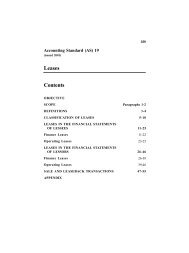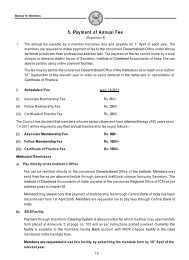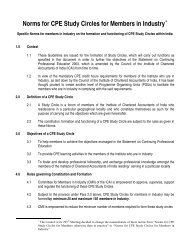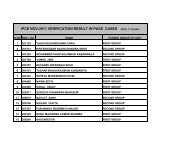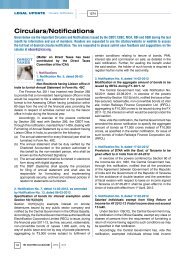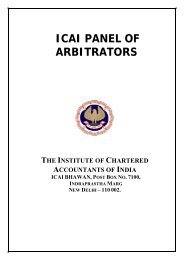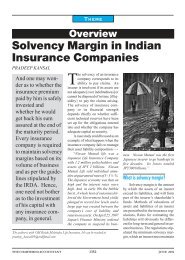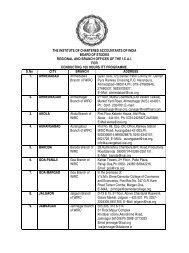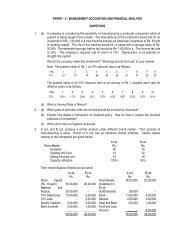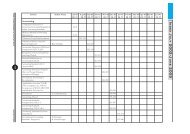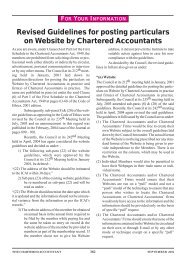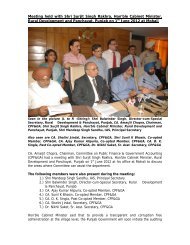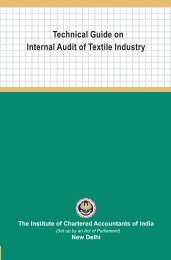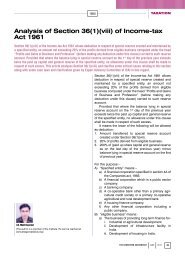The Chartered Accountant
The Chartered Accountant
The Chartered Accountant
Create successful ePaper yourself
Turn your PDF publications into a flip-book with our unique Google optimized e-Paper software.
governance do not provide sufficient<br />
information that supports that the<br />
entity is in compliance with laws and<br />
regulations and, in the auditor’s judgment,<br />
the effect of the suspected noncompliance<br />
may be material to the<br />
financial statements, the auditor shall<br />
consider the need to obtain legal advice.<br />
(Ref: Para. A15-A16)<br />
20. If sufficient information about suspected<br />
non-compliance cannot be obtained,<br />
the auditor shall evaluate the effect<br />
of the lack of sufficient appropriate<br />
audit evidence on the auditor’s opinion.<br />
21. <strong>The</strong> auditor shall evaluate the<br />
implications of non-compliance in<br />
relation to other aspects of the audit,<br />
including the auditor’s risk assessment<br />
and the reliability of written representations,<br />
and take appropriate action.<br />
(Ref: Para. A17-A18)<br />
Reporting of Identified or Suspected<br />
Non-Compliance<br />
Reporting Non-Compliance to<br />
Those Charged with Governance<br />
22. Unless all of those charged with<br />
governance are involved in management<br />
of the entity, and therefore are<br />
aware of matters involving identified<br />
or suspected non-compliance already<br />
communicated by the auditor, 6 the<br />
auditor shall communicate with those<br />
charged with governance matters involving<br />
non-compliance with laws<br />
and regulations that come to the auditor’s<br />
attention during the course of<br />
the audit, other than when the matters<br />
are clearly inconsequential.<br />
23. If, in the auditor’s judgment, the<br />
non-compliance referred to in paragraph<br />
22 is believed to be intentional<br />
and material, the auditor shall communicate<br />
the matter to those charged with<br />
governance as soon as practicable.<br />
24. If the auditor suspects that management<br />
or those charged with governance<br />
are involved in non-compliance,<br />
the auditor shall communicate<br />
the matter to the next higher level of<br />
STANDARDS<br />
authority at the entity, if it exists, such<br />
as an audit committee or supervisory<br />
board. Where no higher authority<br />
exists, or if the auditor believes that<br />
the communication may not be acted<br />
upon or is unsure as to the person to<br />
whom to report, the auditor shall consider<br />
the need to obtain legal advice.<br />
Reporting Non-Compliance in the<br />
Auditor’s Report on the Financial<br />
Statements<br />
25. If the auditor concludes that the<br />
non-compliance has a material effect<br />
on the financial statements, and has<br />
not been adequately reflected in the<br />
financial statements, the auditor shall,<br />
in accordance with Proposed SA 7057 ,<br />
express a qualified or adverse opinion<br />
on the financial statements.<br />
26. If the auditor is precluded by<br />
management or those charged with<br />
governance from obtaining sufficient<br />
appropriate audit evidence to evaluate<br />
whether non-compliance that may<br />
be material to the financial statements<br />
has, or is likely to have, occurred, the<br />
auditor shall express a qualified opinion<br />
or disclaim an opinion on the financial<br />
statements on the basis of a<br />
limitation on the scope of the audit in<br />
accordance with Proposed SA 705.<br />
27. If the auditor is unable to determine<br />
whether non-compliance has occurred<br />
because of limitations imposed<br />
by the circumstances rather than by<br />
management or those charged with<br />
governance, the auditor shall evaluate<br />
the effect on the auditor’s opinion in<br />
accordance with Proposed SA 705.<br />
Reporting Non-Compliance to<br />
Regulatory and Enforcement<br />
Authorities<br />
28. If the auditor has identified or suspects<br />
non-compliance with laws and<br />
regulations, the auditor shall determine<br />
whether the auditor has a responsibility<br />
to report the identified or suspected<br />
non-compliance to parties outside the<br />
entity. (Ref: Para. A19-A20)<br />
Documentation<br />
29. <strong>The</strong> auditor shall document identified<br />
or suspected non-compliance<br />
with laws and regulations and the results<br />
of discussion with management<br />
and, where applicable, those charged<br />
with governance and other parties<br />
outside the entity. (Ref: Para. A21)<br />
***<br />
Application and Other Explanatory<br />
Material<br />
Responsibility for Compliance<br />
with Laws and Regulations<br />
Responsibility of Management for<br />
Compliance with Laws and Regulations<br />
(Ref: Para. 3)<br />
A1. Management, with the oversight<br />
of those charged with governance, is<br />
responsible for ensuring that the entity’s<br />
operations are conducted in accordance<br />
with laws and regulations. Laws<br />
and regulations may affect an entity’s<br />
financial statements in different ways:<br />
for example, most directly, they may<br />
affect specific disclosures required of<br />
the entity in the financial statements<br />
or they may prescribe the applicable<br />
financial reporting framework8 . <strong>The</strong>y<br />
may also establish certain legal rights<br />
and obligations of the entity, some of<br />
which will be recognised in the entity’s<br />
financial statements. In addition, laws<br />
and regulations may impose penalties<br />
in cases of non-compliance.<br />
A2. <strong>The</strong> following are examples of<br />
the types of policies and procedures<br />
an entity may implement to assist in<br />
the prevention and detection of noncompliance<br />
with laws and regulations:<br />
l Monitoring legal requirements<br />
and ensuring that operating<br />
procedures are designed to<br />
meet these requirements.<br />
l Instituting and operating appropriate<br />
systems of internal<br />
control.<br />
l Developing, publicising and following<br />
a code of conduct.<br />
6 Revised SA 260, “Communication with Those Charged with Governance”, paragraph 9.<br />
7 Proposed SA 705, “Modifications to the Opinion in the Independent Auditor’s Report”. <strong>The</strong> Standard is being formulated in the light of the corresponding International<br />
Standard. Presently, the concept of modified opinion is dealt within SA 700, “<strong>The</strong> Auditor’s Report on Financial Statements”.<br />
8 Revised ISA 200, “Overall Objectives of the Independent Auditor and the Conduct of an Audit in accordance with International Standards on Auditing”, paragraph 13 (a)<br />
defines the applicable financial reporting framework as “<strong>The</strong> financial reporting framework adopted by management and, where appropriate, those charged with governance<br />
in the preparation and presentation of the financial statements that is acceptable in view of the nature of the entity and the objective of the financial statements, or that is<br />
required by law or regulation. <strong>The</strong> term “fair presentation framework” is used to refer to a financial reporting framework that requires compliance with the requirements of<br />
the framework and:<br />
(i) Acknowledges explicitly or implicitly that, to achieve fair presentation of the financial statements, it may be necessary for management to provide disclosures beyond those<br />
specifically required by the framework; or<br />
(ii) Acknowledges explicitly that it may be necessary for management to depart from a requirement of the framework to achieve fair presentation of the financial statements.<br />
Such departures are expected to be necessary only in extremely rare circumstances.<br />
THE CHARTERED ACCOUNTANT 1087 DECEMBER 2008



